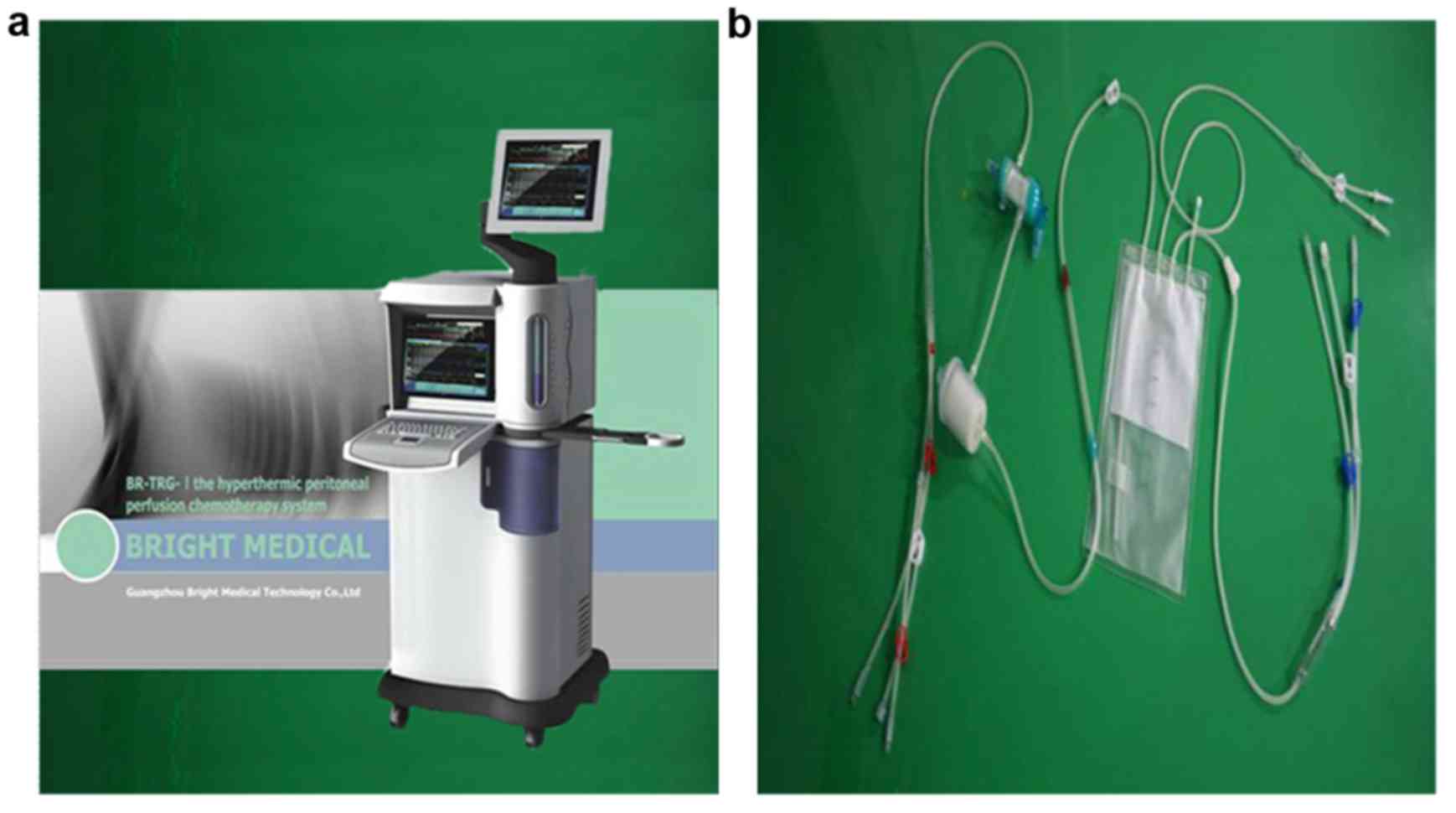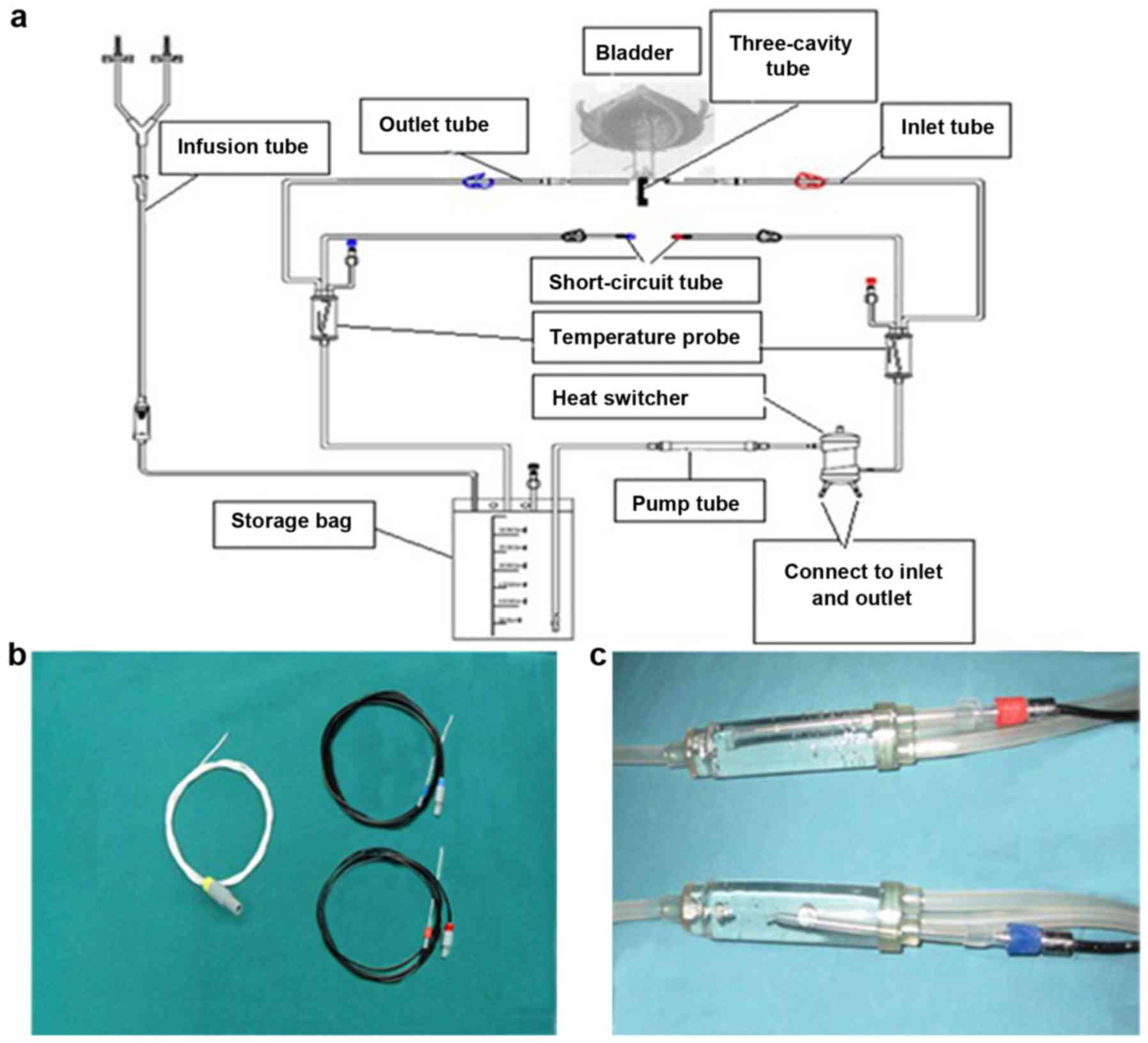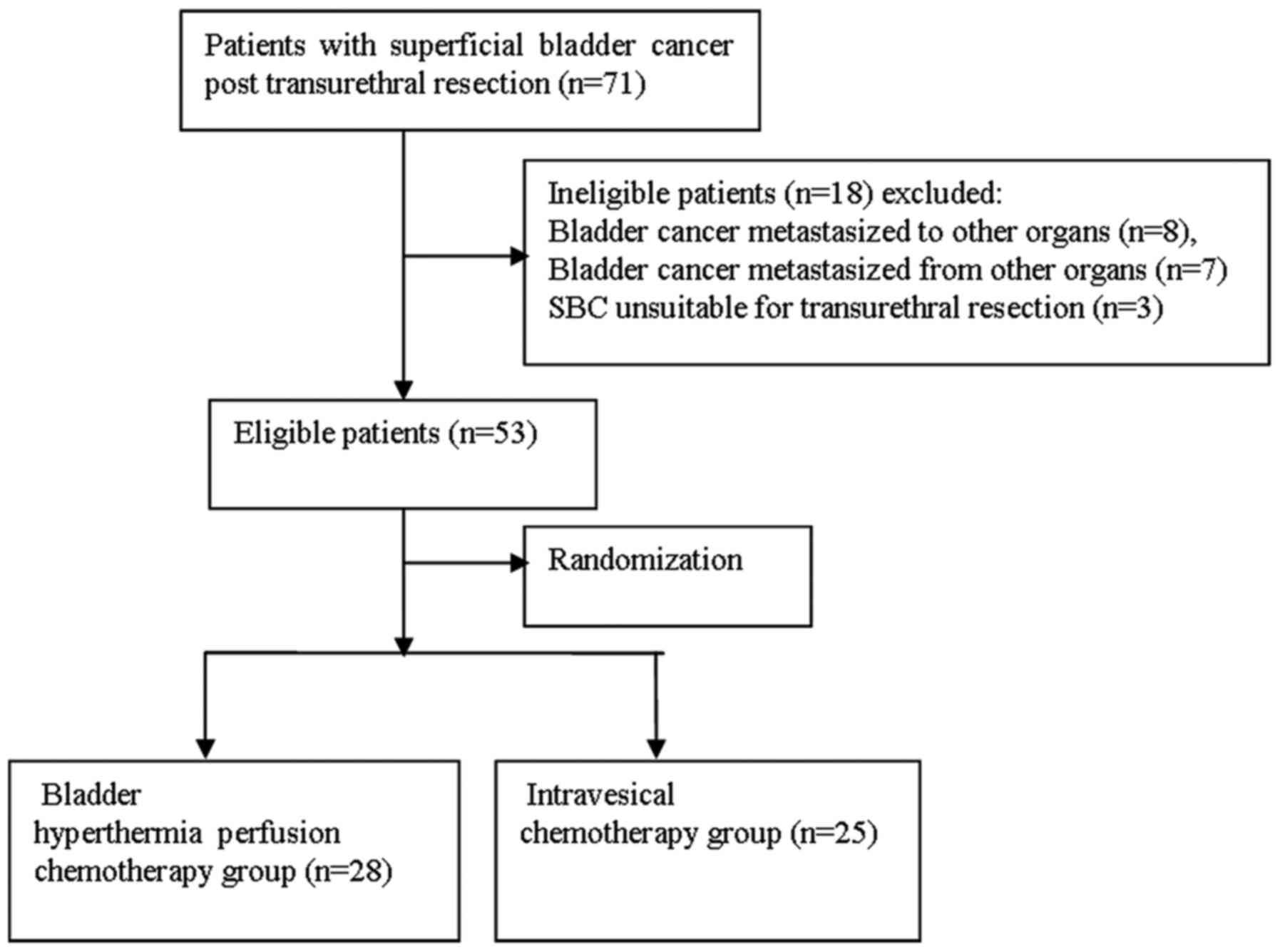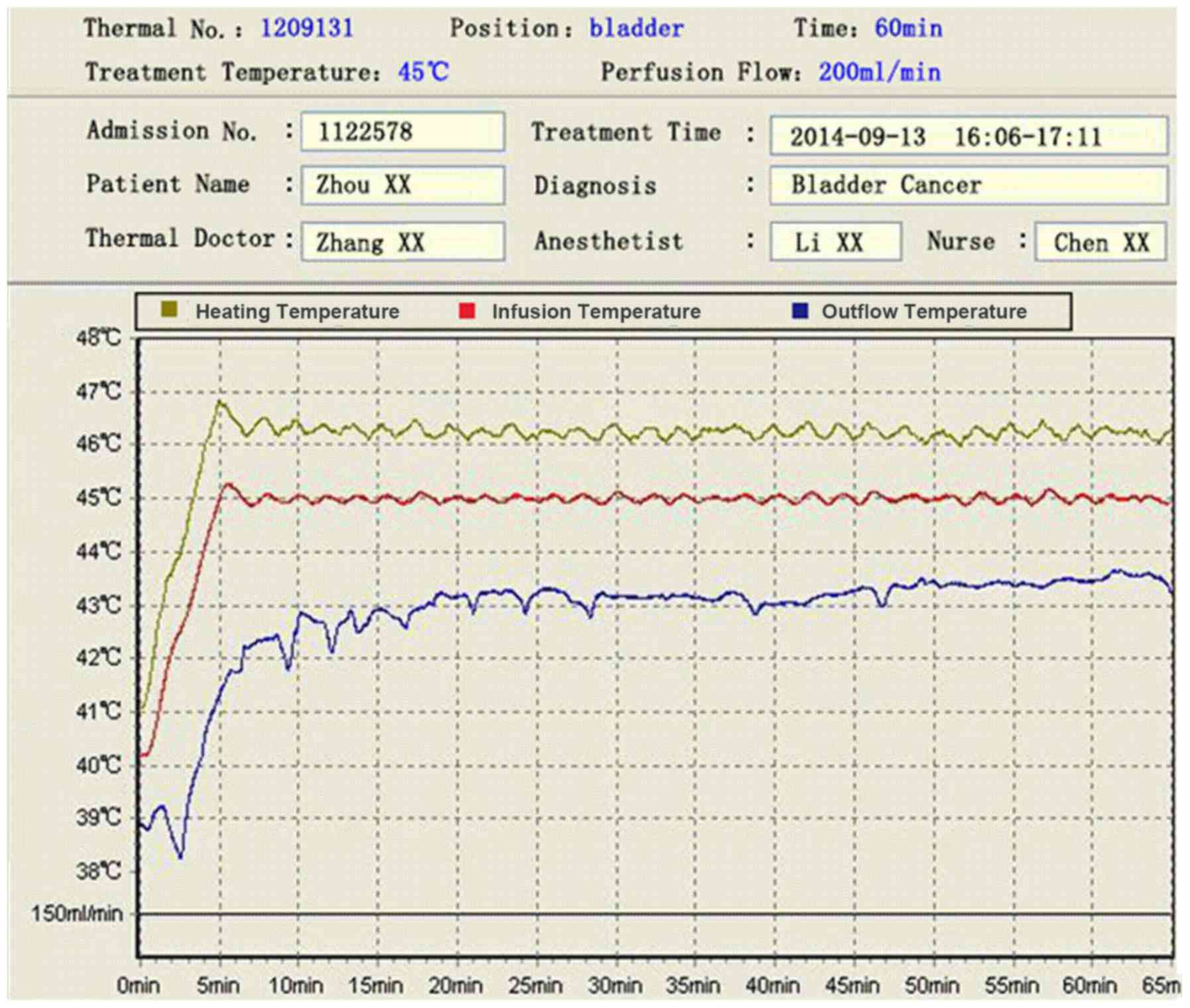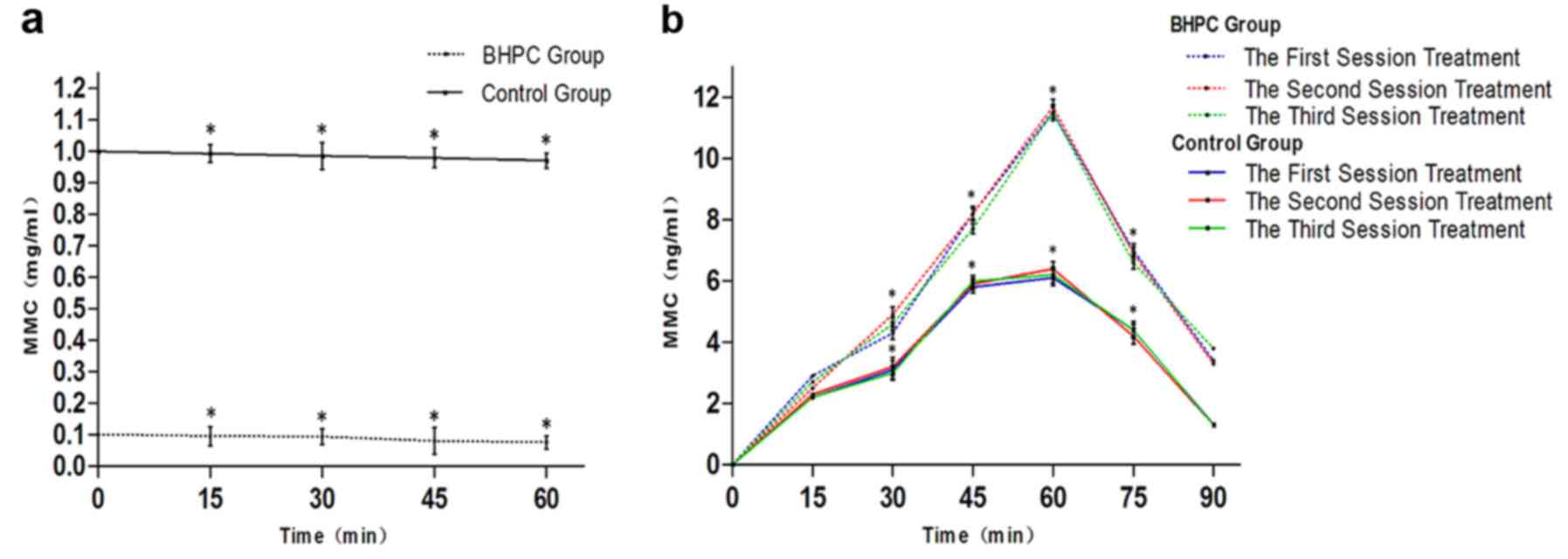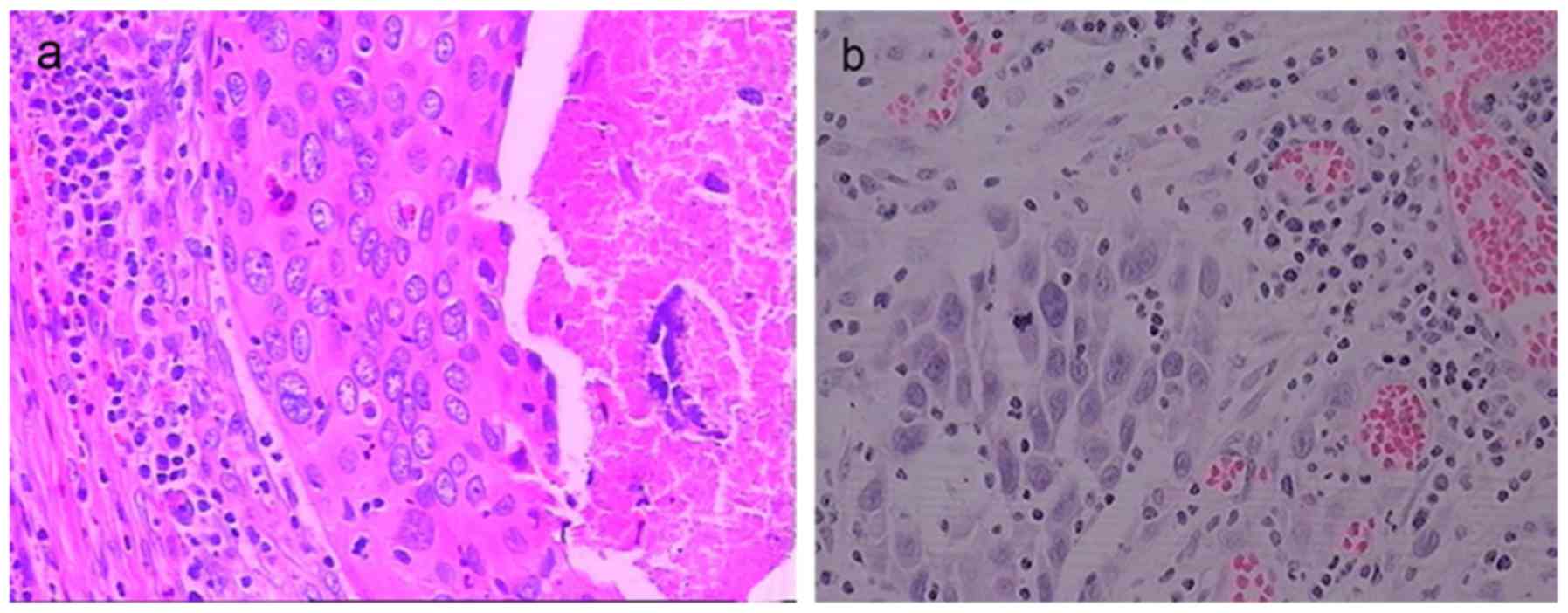|
1
|
Siegel R, Naishadham D and Jemal A: Cancer
statistics, 2012. CA Cancer J Clin. 62:10–29. 2012. View Article : Google Scholar : PubMed/NCBI
|
|
2
|
Hızlı F, Argun G, Güney I, Güven O, Arık
AI, Başay S, Günaydın H, Başar H and Köşüş A: Obturator nerve block
transurethral surgery for bladder cancer: Comparison of inguinal
and intravesical approaches: Prospective randomized trial. Ir J Med
Sci. 185:555–560. 2016. View Article : Google Scholar : PubMed/NCBI
|
|
3
|
Aziz A, Gierth M, Rink M, Schmid M, Chun
FK, Dahlem R, Roghmann F, Palisaar RJ, Noldus J, Ellinger J, et al:
PROMETRICS 2011 Research Group: Optimizing outcome reporting after
radical cystectomy for organ-confined urothelial carcinoma of the
bladder using oncological trifecta and pentafecta. World J Urol.
33:1945–1950. 2015. View Article : Google Scholar : PubMed/NCBI
|
|
4
|
Hermann GG, Mogensen K, Lindvold LR, Haak
CS and Haedersdal M: Office-based transurethral devascularisation
of low grade non-invasive urothelial cancer using diode laser. A
feasibility study. Lasers Surg Med. 47:620–625. 2015. View Article : Google Scholar : PubMed/NCBI
|
|
5
|
Stein JP, Lieskovsky G, Cote R, Groshen S,
Feng AC, Boyd S, Skinner E, Bochner B, Thangathurai D, Mikhail M,
et al: Radical cystectomy in the treatment of invasive bladder
cancer: Long-term results in 1,054 patients. J Clin Oncol.
19:666–675. 2001. View Article : Google Scholar : PubMed/NCBI
|
|
6
|
Takai T, Inamoto T, Komura K, Yoshikawa Y,
Uchimoto T, Saito K, Tanda N, Kouno J, Minami K, Uehara H, et al:
Feasibility of photodynamic diagnosis for challenging TUR-Bt cases
including muscle invasive bladder cancer, BCG failure or 2nd-TUR.
Asian Pac J Cancer Prev. 16:2297–2301. 2015. View Article : Google Scholar : PubMed/NCBI
|
|
7
|
Lamm DL, Riggs DR, Traynelis CL and Nseyo
UO: Apparent failure of current intravesical chemotherapy
prophylaxis to influence the long-term course of superficial
transitional cell carcinoma of the bladder. J Urol. 153:1444–1450.
1995. View Article : Google Scholar : PubMed/NCBI
|
|
8
|
Newling D: Intravesical therapy in the
management of superficial transitional cell carcinoma of the
bladder: The experience of the EORTC GU Group. Br J Cancer.
61:497–499. 1990. View Article : Google Scholar : PubMed/NCBI
|
|
9
|
Rawls WH, Lamm DL, Lowe BA, Crawford ED,
Sarosdy MF, Montie JE, Grossman HB and Scardino PT: Fatal sepsis
following intravesical bacillus Calmette-Guerin administration for
bladder cancer. J Urol. 144:1328–1330. 1990.PubMed/NCBI
|
|
10
|
Hayne D, Stockler M, McCombie SP,
Chalasani V, Long A, Martin A, Sengupta S and Davis ID: BCG+MMC
trial: Adding mitomycin C to BCG as adjuvant intravesical therapy
for high-risk, non-muscle-invasive bladder cancer: A randomised
phase III trial (ANZUP 1301). BMC Cancer. 15:4322015. View Article : Google Scholar : PubMed/NCBI
|
|
11
|
Kamat AM, Briggman J, Urbauer DL, Svatek
R, Nogueras González GM, Anderson R, Grossman HB, Prat F and Dinney
CP: Cytokine panel for response to intravesical therapy (CyPRIT):
Nomogram of changes in urinary cytokine levels predicts patient
pesponse to bacillus Calmette-Guérin. Eur Urol. 69:197–200. 2016.
View Article : Google Scholar : PubMed/NCBI
|
|
12
|
Ferlazzo G, Magno C, Lupo G, Rizzo M,
Iemmo R, Semino C and Melioli G: A phase I study of intravesical
continuous perfusion of recombinant interleukin-2 in patients with
superficial bladder cancer. Am J Clin Oncol. 18:100–104. 1995.
View Article : Google Scholar : PubMed/NCBI
|
|
13
|
Colombo R, Da Pozzo LF, Lev A, Freschi M,
Gallus G and Rigatti P: Neoadjuvant combined microwave induced
local hyperthermia and topical chemotherapy versus chemotherapy
alone for superficial bladder cancer. J Urol. 155:1227–1232. 1996.
View Article : Google Scholar : PubMed/NCBI
|
|
14
|
Geijsen ED, de Reijke TM, Koning CC,
Vörding Zum Vörde Sive PJ, de la Rosette JJ, Rasch CR, van Os RM
and Crezee J: Combining mitomycin C and regional 70 MHz
hyperthermia in patients with nonmuscle invasive bladder cancer: A
pilot study. J Urol. 194:1202–1208. 2015. View Article : Google Scholar : PubMed/NCBI
|
|
15
|
Colombo R, Salonia A, Da Pozzo LF, Naspro
R, Freschi M, Paroni R, Pavone-Macaluso M and Rigatti P:
Combination of intravesical chemotherapy and hyperthermia for the
treatment of superficial bladder cancer: Preliminary clinical
experience. Crit Rev Oncol Hematol. 47:127–139. 2003. View Article : Google Scholar : PubMed/NCBI
|
|
16
|
Gofrit ON, Shapiro A, Pode D, Sidi A,
Nativ O, Leib Z, Witjes JA, van der Heijden AG, Naspro R and
Colombo R: Combined local bladder hyperthermia and intravesical
chemotherapy for the treatment of high-grade superficial bladder
cancer. Urology. 63:466–471. 2004. View Article : Google Scholar : PubMed/NCBI
|
|
17
|
Milla P, Fiorito C, Soria F, Arpicco S,
Cattel L and Gontero P: Intravesical thermo-chemotherapy based on
conductive heat: A first pharmacokinetic study with mitomycin C in
superficial transitional cell carcinoma patients. Cancer Chemother
Pharmacol. 73:503–509. 2014. View Article : Google Scholar : PubMed/NCBI
|
|
18
|
Uchibayashi T, Nakajima K, Hisazumi H,
Nishino A and Miyoshi N: Hyperthermic intravesical peplomycin
perfusion treatment for bladder cancer. Br J Urol. 72:65–67. 1993.
View Article : Google Scholar : PubMed/NCBI
|
|
19
|
Owusu RA, Abern MR and Inman BA:
Hyperthermia as adjunct to intravesical chemotherapy for bladder
cancer. Biomed Res Int. 2013:2623132013. View Article : Google Scholar : PubMed/NCBI
|
|
20
|
Ekin RG, Akarken I, Cakmak O, Tarhan H,
Celik O, Ilbey YO, Divrik RT and Zorlu F: Results of intravesical
chemo-hyperthermia in high-risk non-muscle invasive bladder cancer.
Asian Pac J Cancer Prev. 16:3241–3245. 2015. View Article : Google Scholar : PubMed/NCBI
|
|
21
|
Paroni R, Salonia A, Lev A, Da Pozzo LF,
Cighetti G, Montorsi F, Rigatti P and Colombo R: Effect of local
hyperthermia of the bladder on mitomycin C pharmacokinetics during
intravesical chemotherapy for the treatment of superficial
transitional cell carcinoma. Br J Clin Pharmacol. 52:273–278. 2001.
View Article : Google Scholar : PubMed/NCBI
|
|
22
|
Ba M, Long H, Zhang X, Tang Y, Wu Y, Yu F,
Wang S and Cui S: Different sequential approaches of cytoreductive
surgery and hyperthermic intraperitoneal chemotherapy in treating
ovarian cancer with malignant ascites. J Cancer Res Clin Oncol.
140:1497–1506. 2014. View Article : Google Scholar : PubMed/NCBI
|
|
23
|
Ba MC, Long H, Cui SZ, Tang YQ, Wu YB,
Zhang XL, Tang HS and Bai SX: Multivariate comparison of
B-ultrasound guided and laparoscopic continuous circulatory
hyperthermic intraperitoneal perfusion chemotherapy for malignant
ascites. Surg Endosc. 27:2735–2743. 2013. View Article : Google Scholar : PubMed/NCBI
|
|
24
|
Ba MC, Cui SZ, Lin SQ, Tang YQ, Wu YB,
Wang B and Zhang XL: Chemotherapy with laparoscope-assisted
continuous circulatory hyperthermic intraperitoneal perfusion for
malignant ascites. World J Gastroenterol. 16:1901–1907. 2010.
View Article : Google Scholar : PubMed/NCBI
|
|
25
|
Cui S, Ba M, Tang Y, Liu J, Wu Y, Wang B,
Zhang X, Tang H and Zhong S: B ultrasound-guided hyperthermic
intraperitoneal perfusion chemotherapy for the treatment of
malignant ascites. Oncol Rep. 28:1325–1331. 2012.PubMed/NCBI
|
|
26
|
Wittekind C: 2010 TNM system: On the 7th
edition of TNM classification of malignant tumors. Pathologe.
31:331–332. 2010.(In German). View Article : Google Scholar : PubMed/NCBI
|
|
27
|
Dwivedi R, Singh M, Kaleekal T, Gupta YK
and Tripathi M: Concentration of antiepileptic drugs in persons
with epilepsy: A comparative study in serum and saliva. Int J
Neurosci. 126:972–978. 2016. View Article : Google Scholar : PubMed/NCBI
|
|
28
|
Abdelaleem EA, Naguib IA, Zaazaa HE and
Hussein EA: Development and validation of HPLC and HPTLC methods
for determination of cefoperazone and its related impurities. J
Chromatogr Sci. 54:179–186. 2016.PubMed/NCBI
|
|
29
|
Chen AP, Setser A, Anadkat MJ, Cotliar J,
Olsen EA, Garden BC and Lacouture ME: Grading dermatologic adverse
events of cancer treatments: The Common Terminology Criteria for
Adverse Events Version 4.0. J Am Acad Dermatol. 67:1025–1039. 2012.
View Article : Google Scholar : PubMed/NCBI
|
|
30
|
Lammers RJ, Witjes JA, Inman BA,
Leibovitch I, Laufer M, Nativ O and Colombo R: The role of a
combined regimen with intravesical chemotherapy and hyperthermia in
the management of non-muscle-invasive bladder cancer: A systematic
review. Eur Urol. 60:81–93. 2011. View Article : Google Scholar : PubMed/NCBI
|
|
31
|
Inman BA, Stauffer PR, Craciunescu OA,
Maccarini PF, Dewhirst MW and Vujaskovic Z: A pilot clinical trial
of intravesical mitomycin-C and external deep pelvic hyperthermia
for non-muscle-invasive bladder cancer. Int J Hyperthermia.
30:171–175. 2014. View Article : Google Scholar : PubMed/NCBI
|
|
32
|
Soria F, Milla P, Fiorito C, Pisano F,
Sogni F, Di Marco M, Pagliarulo V, Dosio F and Gontero P: Efficacy
and safety of a new device for intravesical thermochemotherapy in
non-grade 3 BCG recurrent NMIBC: A phase I–II study. World J Urol.
34:189–195. 2016. View Article : Google Scholar : PubMed/NCBI
|
|
33
|
Sousa A, Piñeiro I, Rodríguez S, Aparici
V, Monserrat V, Neira P, Carro E, Murias C and Uribarri C:
Recirculant hyperthermic IntraVEsical chemotherapy (HIVEC) in
intermediate-high-risk non-muscle-invasive bladder cancer. Int J
Hyperthermia. 32:374–380. 2016. View Article : Google Scholar : PubMed/NCBI
|
|
34
|
Colombo R, Salonia A, Leib Z,
Pavone-Macaluso M and Engelstein D: Long-term outcomes of a
randomized controlled trial comparing thermochemotherapy with
mitomycin-C alone as adjuvant treatment for non-muscle-invasive
bladder cancer (NMIBC). BJU Int. 107:912–918. 2011. View Article : Google Scholar : PubMed/NCBI
|
|
35
|
van der Heijden AG and Dewhirst MW:
Effects of hyperthermia in neutralising mechanisms of drug
resistance in non-muscle-invasive bladder cancer. Int J
Hyperthermia. 32:434–445. 2016. View Article : Google Scholar : PubMed/NCBI
|















